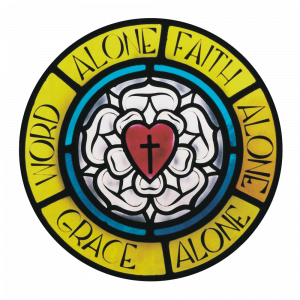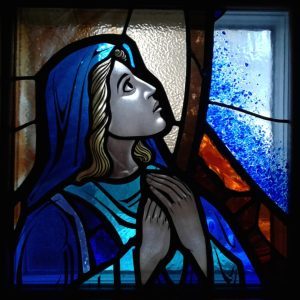The basis of all Lutheran teachings is the Bible. Martin Luther and the other reformers wrote a series of documents answering accusations that their teaching was contrary to commonly held beliefs and practices of the 15th Century church. These defenses and arguments, based upon the Bible and collectively-known as The Lutheran Confessions, were presented before a series of theological gatherings. Eventually, they were compiled into The Book of Concord. These texts comprise the doctrine and confession of the Lutheran Church.
For additional information on the beliefs and teachings of Lutheran Church–Canada, visit the webpage What We Believe.

Who are Lutherans?
Lutherans take their name from Martin Luther, an Augustinian monk and theologian in 16th century Germany. He believed that the church was ignoring or contradicting important teachings of Christ, and that it had become corrupt as an institution.
Because his convictions were deeply felt, in 1517 he published 95 theses (or statements) for discussion and debate within the church. His aim was to reform the church so that Christ’s gospel was restored to the central position in the church’s life and teaching.
Luther did not want to leave the church but the church’s leadership regarded his views as disturbing and dangerous. In 1520 he was excommunicated but he continued to proclaim his views in his preaching, teaching, and writing.
Luther was supported by a growing number of people including many clergy and secular rulers. In a short time, large areas of Germany became ‘Lutheran’ and Lutheranism took root in other European countries.
The Lutheran Church was the first church to grow out of the Reformation movement. The Reformation was kindled by Luther’s 95 theses and rapidly spread throughout western Europe, influencing also the church in Britain at the time of Henry VIII.
The Lutheran Church continues to be one of the largest churches in the world. It developed first in Germany, Scandinavia, and the Baltic states and now comprises some 60 to 70 million members in all regions of the world.

What do Lutherans believe?
Lutherans profess the historic creeds* of the Christian church, which proclaim that God is a Trinity – Father, Son and Holy Spirit – the Creator, Saviour, and Comforter of all that exists. As a Lutheran, we believe that the Holy Bible, both the Old and New Testament, is in all its words the inspired Word of God and, consequently, true and trustworthy.
In the ten commandments and in other Scripture passages, the Bible shows us that all people are born and live as sinners – rebelling against God, His ways, and His commandments. And if not for God’s grace and love, all people would endure eternal death as the penalty for their sins. But God so loved the world that He sent His own Son, Jesus Christ, to die for the sins of every human being. By Jesus’ suffering and death on the cross, the world has been redeemed and reconciled to God; and, by Jesus’ resurrection from the dead, He proclaimed victory over death and the grave. Just as Jesus rose from the dead, all who believe in Him as their Saviour will also live forever with Him in heaven when their earthly life has ended.
Lutherans especially emphasize that God offers his eternal love to humans as a gift – it is not something that they can earn by what they do. In Christ, God has shown us He accepts us as we are – with our many failings. In believing that alone, we are put right with God. Lutherans sum this up by professing that we are ‘justified by grace, through faith’. Such faith empowers people to express love to their neighbours freely, not in an effort to win God’s salvation, but in praise of the God who loves us unconditionally and eternally.
* an example of an historic creed is The Apostles’ Creed.
For additional information on Lutheran beliefs and teachings, visit the webpage Who is Jesus? and document What About … Being a Lutheran prepared by the Lutheran Church Missouri Synod.

How do Lutherans worship?
As Lutheran services are conducted in many different languages, cultures, and countries, there are inevitably variations in expressions and styles of worship. Generally, however, Lutheran services are in the ‘catholic’ tradition, following the ancient liturgies and observing historic usage. Music has always been an important part of Lutheran worship – services are often sung and instrumental music is common. There have been many great Lutheran composers who wrote prolifically for their churches – perhaps Johann Sebastian Bach and Felix Mendelssohn are the best known.
Lutherans celebrate Holy Communion regularly, believing that Christ is truly present in his fullness in the bread and wine of the sacrament. Lutherans administer Holy Baptism to infants and adults, believing that God strengthens faith through the water used in this sacrament.
Worship in the Lutheran Church–Canada is dignified and traditional, but retains a sense of informality and flexibility that helps visitors feel welcome. For additional information on Lutheran worship, see the document What About … Lutheran Worship.

How do Lutherans relate to other Christians and non-Christian?
On a global level, Lutheran Church-Canada and Lutheran Church Missouri Synod have been engaged in productive discussions in recent years with the Roman Catholic Church, Anglican Church in North America (ACNA), and North American Lutheran Church (NALC) which has helped these churches to deepen their understanding and appreciation of each other. See this update on Lutheran Church-Canada’s ongoing ecumenical dialogues from The Canadian Lutheran.
The Lutheran Church, responding to God’s grace and guided by His Word, acts with genuine care and concern towards all people as we search for those who are separated from the love of God and the Gospel of Jesus Christ. With an intent and purpose of reaching the hearts of everyone, the church is commissioned to carry Christ’s message of salvation to all regions of the world, binding all together so that all persons may grow toward spiritual maturity.
In these and many other ways, Lutherans strive for reconciled diversity in the one body of Christ, always carrying His message of salvation to people everywhere.
Acknowledgments:
In preparing this section, we would like to recognize, and give thanks to, the many diverse Lutheran churches and church organizations that provided information used or quoted above, including: the leaflet Introducing the Lutheran Church in Great Britain, the website for St. Columbia Lutheran Church in Glasgow, Scotland, and the websites for Lutheran Church–Canada and Lutheran Church Missouri Synod. As well, appreciation is extended to various (and numerous) other Lutheran congregations that either inspired or indirectly contributed ideas, sentences, or statements presented in this section.
